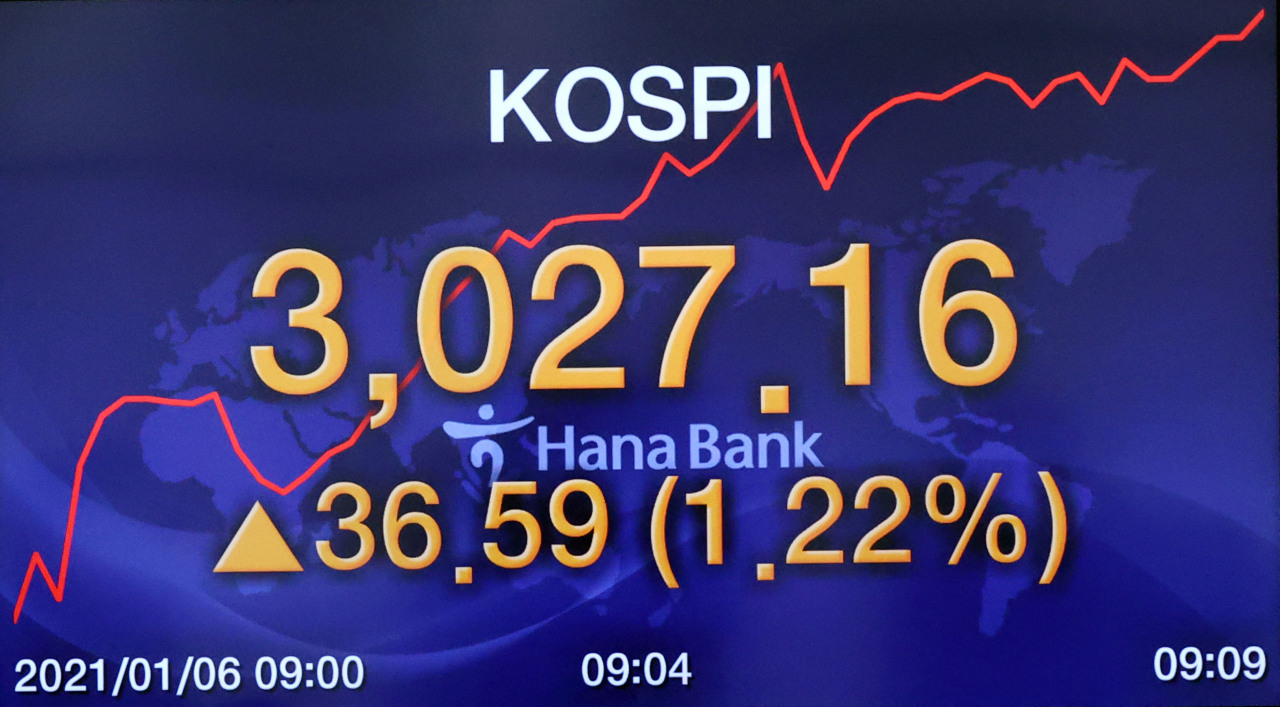South Korean retail investors, who have been on a buying spree in recent months, brought benchmark indexes to fresh highs during intraday trading Wednesday.
The Kospi touched 3,000 points for the first time in the market’s 38-year history in the early morning session, stretching to as high as 3,027.16 points.
But the Kospi pulled back to close at 2,968.21 points, down 22.36 points, or 0.8 percent, shy of the previous session‘s close. The Kospi had maintained a record run for six consecutive days until Tuesday.
Individual investors were strong buyers, net purchasing over 2 trillion won ($1.84 billion) of Kospi-listed stocks.
The main bourse’s combined market capitalization of 916 constituents came to 2,043 trillion won. Of the total, losers outnumbered gainers on the Kospi 457 to 394.
Blue chips were mixed in early afternoon trade. Market bellwether Samsung Electronics slid 2 percent, LG Chem edged down 0.3 percent and semiconductor manufacturer SK hynix gained 0.4 percent. Internet firm Naver shed 0.9 percent, while its rival Kakao climbed 0.6 percent. Automaker Hyundai Motor dropped 3.1 percent.
It took over 13 years for Kospi to break the 3,000 barrier after it crossed 2,000 points for the first time in 2007.
Stocks of the KRX‘s development board Kosdaq showed a similar trading pattern, hitting a record high of 990.88 points in early morning trade and closing at 981.39, down 0.4 percent.
The news of the nation’s stock market indexes touching all-time highs came in line with a series of record rallies of global stocks, as liquidity-driven investors pinned hopes on an economic recovery.
The market liquidity, which first took shape in early 2020 in response to the fallout of the coronavirus pandemic, will continue to boost stock markets for the time being, analysts said.
While further global monetary expansions are unlikely, the weakness of the US dollar is adding to the liquidity driving the foreign capital influx, wrote Kim Il-goo, an analyst at Hanwha Investment & Securities.
“Weak dollars will encourage companies using dollars as their accounting currency to increase investment in global financial markets,” Kim said.
“We view the interest rate hike as unlikely, as central banks support monetary relief to bring the economy back on track,” wrote Lee Dong-ho, an analyst at Leading Investment & Securities.
Global traders were also paying close attention to the senate runoff elections in the US state of Georgia, which will determine control of the US Senate. The results are viewed as pivotal to whether the US introduces a corporate tax hike or new regulations, leading to a cut in corporate earnings, but local analysts said its impact on the Korean market will be limited.
“Korean equity investors will rather be focusing on the expansionary fiscal policy” of a potential Democrat majority in the Senate, wrote Choi Yoo-june, a market analyst at Shinhan Investment, in a note, explaining that the fiscal stimulus by US President-elect Joe Biden would likely speed up economic recovery and maintain the weak dollar, boosting the flow of capital into the Korean stock market.
Korea‘s local currency rose against the US dollar Wednesday. The Korean won was trading at 1,085.6 won per dollar during the session‘s close, strengthening by 2 won from Tuesday.
By Son Ji-hyoung (
consnow@heraldcorp.com)








